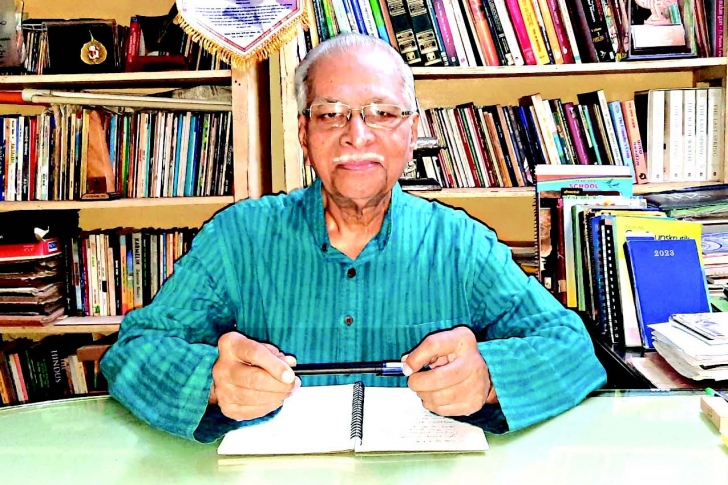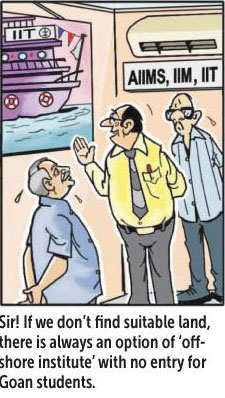
Dolcy D’Cruz
After the success of his first novel ‘Vhoddlem Ghor’ which was translated in English, well-known Konkani writer Uday Bhembre now presents his second novel, ‘Kator Re Bhaji’ that is based on the life of Abbe Faria. A fictional novel, it traces the life of Abbe Faria from Goa to Lisbon to Rome and finally France. From a 15 year old leaving the comforts of his home in Colvale, he took on the journey with his father, who was a priest, to etching his name in the pages of history as the pioneer of modern hypnotism. However, his life story has still been a mystery that caught the attention of Uday Bhembre.
“I have been researching and writing this book for four years. José Custódio de Faria was born in Candolim and there were many biogrpahies written about him. Dr Daniel Gelásio Dalgado, the brother of Msgr Sebastião Rodolfo Dalgado took pride in Abbe Faria being a Goan and wanted to learn more about his thesis. Abbe Faria’s thesis was out of print by that time so he somehow obtained one copy and got it reprinted with his own long introduction. He said that Abbé Faria’s French was not very lucid. It was a bit complicated so he made some of his points in his science easier to understand,” says Uday Bhembre.
He further adds, “Then, he thought of writing Abbé Faria’s biography and he visited every place where Abbé Faria had stayed, where he had worked and where he died. Dr Dalgado tried to obtain the proof of it and not merely information. He went from place to place and found documentation about his work in France and whatever he found or confirmed he wrote it in the biography. He didn’t use his own ideas to fill up the gaps in his life, he didn’t get the complete life of Abbe Faria. Dr Dalgado published the biography ‘Memoir of the Life of the Abbe de Faria: Explanation of the Charming Legend of the Chateau d’If’ in French in 1906. Both the books were in French and had limited circulation and didn’t reach the English reading population. Only in 2004, Prof Laurent Carrer, a hypnotherapist in the USA translated both the Dr Dalgado books in English and put them into one book which then reached a wider readership. Paradoxically, the book is registered at Central Library in Goa but it is not found. I wrote to my friends in Canada and USA to get a copy which took me sometime.”
Uday didn’t start writing until he got the book because Dr Dalgado’s biography is the only authoritative biography while the other biographers had written what they had heard without authentication. Going through the biography, Uday realised that there were many gaps in the biography, some of three years, five years, seven years and even 11 years. “Dr Dalgado tells many things correctly which have been mistakenly written by other biographers. He clarifies that Abbe Faria was never in prison. Many biographers had written that Abbe Faria was visiting a gambling place in Paris. Dalgado said, ‘I went to that gambling place but it looks bizarre but it is true’. However, nobody gives reason behind it, they merely state facts and go ahead. Nobody explains why so I had to provide answers in line with his life and work.
I had to fill up those gaps, I could not leave them as there and that took time,” explains Uday.
Many thought and still think that Abbe Faria is a fictional character from Alexandre Dumas' 1844 novel ‘The Count of Monte Cristo’. Dr Dalgado’s investigation led him to Madame Chiblaise hotel where Abbe Faria was living for three years in Paris. The hotel had been rebuilt and when the receptionist was questioned about Abbe Faria, she laughed and said that Abbe Faria is not a real person. The character of the same name was described as an Italian priest who was imprisoned in in the Château d'If. Uday says “Count of Monte Cristo’ made a lot of difference. It was very popular and translated into many languages and there he describes a character called Abbe Faria. Many biographers put it in the biography and Dr Dalgado cleared this fact and said he was never in prison.”
Another interesting fact about Abbe Faria that Uday noticed in the writings was how he introduced himself. “He describes himself as a writer, Brahman, a Fellow of the Paris University and a member of the Medical Society of Marseille. He never called himself a priest but he is proud of these things. He taught in one department of the University and also at another academy in Marseille. However, no one explains how he could be a member of a medical society because he had not done any studies in medicine. I had to reason it out through my imagination and the other facts of how he might have earned that membership. He was trying this hypnotism at the same time and his colleagues must have noticed it.”
Uday was surprised by the ignorance of the young about Abbe Faria which made his select his life as the focal point for his novel. “Between 2014 and 2018, I was invited by Goa University as a visiting professor to teach two subjects to MA students and one of the subjects was the writings of Shenoy Goembab, which included a short biography of Abbe Faria. The class of 40 students didn’t know
who Abbé Faria was and if this is the ignorance when there are seven biographies available, there is even ignorance in our society. This is the right subject to write about,” explains Uday about the genesis of the idea for the book.
However, many of Uday’s friends were sceptic about his choice of topic and even the title of the book. Interestingly, it is also the title of a play written and directed by Isabel de Santa Rita Vas and performed by the Mustard Seed Art Company, an Indian theatre troupe from Goa, which celebrated the 250th anniversary of Faria's birth. “I was apprehensive whether to use it but I realised it was a important factor and I discussed some of the things with Isabel Vaz. It was the words of Abbe Faria’s father and this was Abbe Faria’s mantra.
These were the words on which he transformed his life and he based his whole theory.”
Published by Sanjana Publications, Uday’s second novel ‘Kator Re Bhaji’ will be launched today, November 16 at 5 pm at Art and Culture Department's hall, Panjim.
